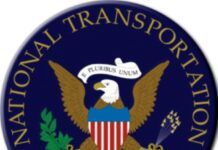 Former NTSB Chairman Jim Hall says high-wing twin turboprop airliners similar to the Bombardier Q400 should be grounded until the NTSB determines whether icing caused the crash of Continental Flight 3407 in Buffalo last Thursday. However, undoubtedly to the relief of a major subset of the aviation industry, there doesn’t seem to be much chance of that happening. “We don’t have any data right now that would lead us to ground this aircraft,” FAA spokesperson Laura Brown told The Toronto Star. “The FAA and the whole aviation industry has worked aggressively over the past 15 years to reduce accidents related to icing and those accidents have dropped significantly as a result of that work. The aircraft involved in the crash has a sophisticated ice detection and protection system that benefited from years of research and analysis about how aircraft operate and perform in icy conditions,” Brown said.
Former NTSB Chairman Jim Hall says high-wing twin turboprop airliners similar to the Bombardier Q400 should be grounded until the NTSB determines whether icing caused the crash of Continental Flight 3407 in Buffalo last Thursday. However, undoubtedly to the relief of a major subset of the aviation industry, there doesn’t seem to be much chance of that happening. “We don’t have any data right now that would lead us to ground this aircraft,” FAA spokesperson Laura Brown told The Toronto Star. “The FAA and the whole aviation industry has worked aggressively over the past 15 years to reduce accidents related to icing and those accidents have dropped significantly as a result of that work. The aircraft involved in the crash has a sophisticated ice detection and protection system that benefited from years of research and analysis about how aircraft operate and perform in icy conditions,” Brown said.
It could be two years before the NTSB’s final report on the crash is released and for now, at least, the board isn’t saying that ice brought the Bombardier Q400 down, killing all 49 people aboard and one in the house that it hit. It seems Hall isn’t a fan of the de-icing boots that provide protection for most turboprops, preferring the bleed air systems that heat the ice-prone surfaces of jets. “I think the prudent thing to do … is ground the aircraft,” until the board investigation is finished, he told the Star. He noted an ATR-72, which shares the same basic configuration of the Bombardier Dash 8 series, of which the Q400 is the latest variant, was brought down by ice in 2000. He said it’s not the aircraft or the manufacturers he’s targeting, but the certification process. “My concern is with the failure in the certification process in the United States in light of accidents involving aircrafts similarly designed, which was the ATR-72.”


































